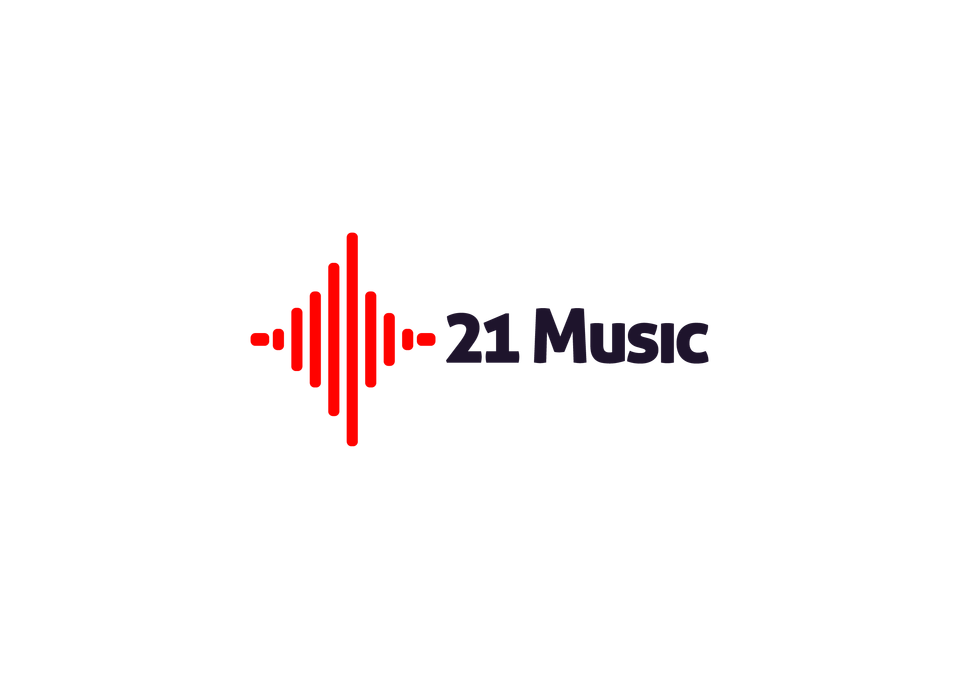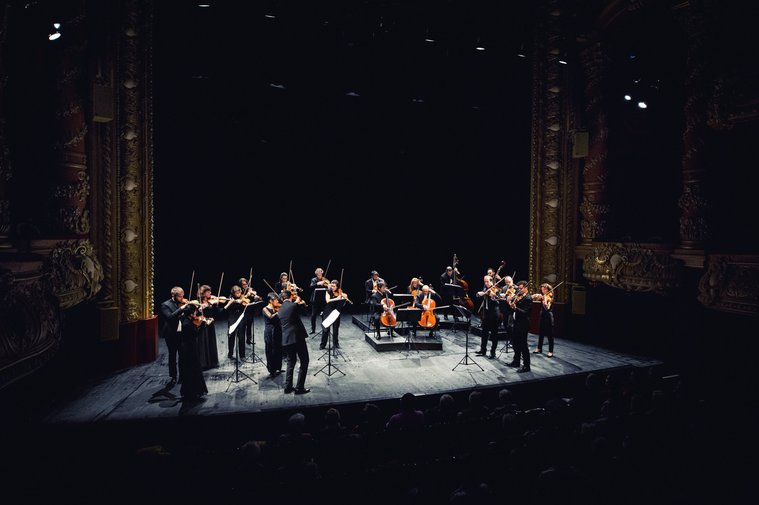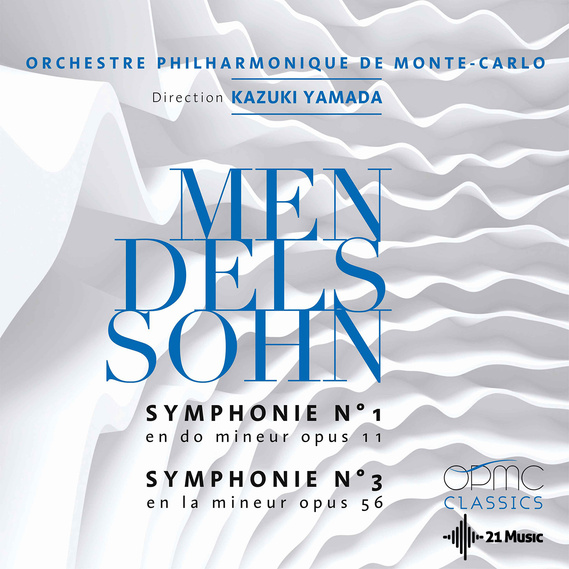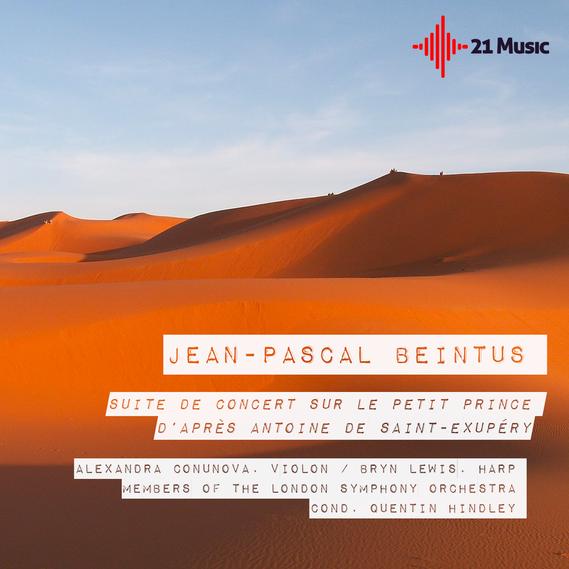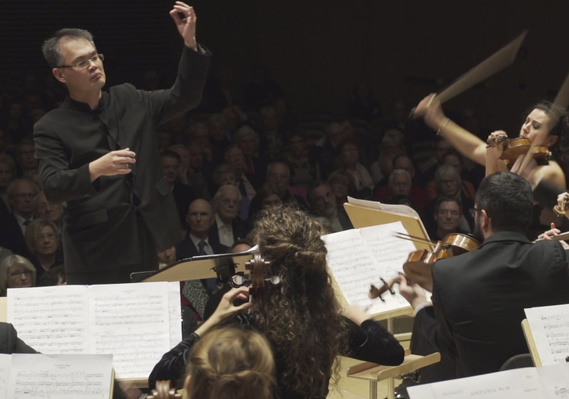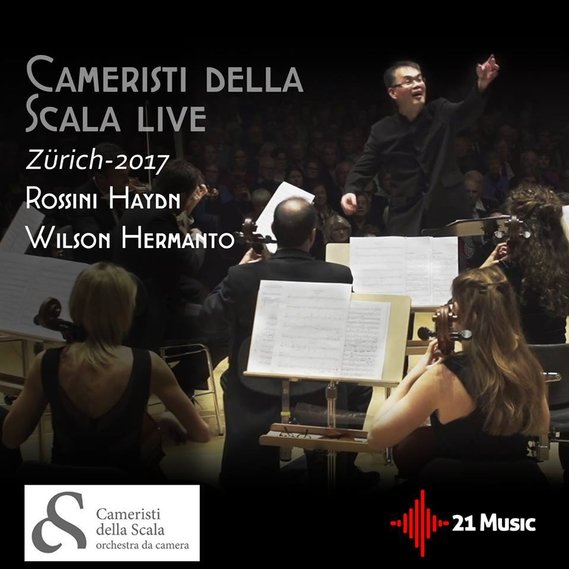21 Music : label digital ! Music Ahead !
21 Music provides international artistic promotion services to musical institutions, either distributing their digital recordings or supporting them in the creation of both digital and physical productions. Drawing on its extensive experience in all areas of album production, including communication with international media organisations, 21 Music is a flexible, committed partner, offering strategic support to orchestras, ensembles and artists.
21 Music collaborates with the Orchestre national Auvergne-Rhône-Alpes, Orchestre philharmonique de Monte-Carlo, Ensemble Variances and Cameristi della Scala, and also boasts a selection of its own productions of several works by composer Jean-Pascal Beintus, alongside a series of historical recordings.
21 Music enables orchestras and artists to see their music accessible in every corner of the globe via 24 platforms and to appear in international charts and playlists (Apple Music, Spotify, etc.), whilst making noise amongst specialist and general international media players.
Orchestre national Auvergne-Rhône-Alpes
In January 2019, the Orchestre national Auvergne-Rhône-Alpes broke new ground on the French music scene with the launch of Orchestre national d’Auvergne Live: the first exclusively digital label ever to be created by a French orchestra. Four and a half years later, its catalogue boasts a total of 15 albums recorded live in concert, now available to stream or download in every corner of the globe.
These tracks have achieved national and international critical acclaim and are now enjoyed by music lovers worldwide, featuring time and time again in playlists and charts on the likes of Spotify and Apple Music.
However, with a wealth of physical recordings dating back to when it was founded in 1981, the Orchestre national d’Auvergne now enriches its discography with Crépuscule, the first album released under its new OnA label, recorded in the studio under the baton of Roberto Forés Veses.
Driven by the artistic innovation and excellence deeply engrained in its DNA, the Auvergne-based orchestra is therefore the first French ensemble to produce and distribute its own live concert and studio recordings, and to offer them in both physical and digital formats.
“In a connected world, we have to develop a strong digital presence and that is why we are creating this label, unique in France. To allow audiences around the world to discover this wonderful orchestra and the beautiful Auvergne region.” Roberto Forés Veses
Under the baton of Principal Conductor Thomas Zehetmair and Associate Conductors Enrico Onofri and Christian Zacharias, the Orchestre national Auvergne-Rhône-Alpes is thrilled to launch a brand new musical season packed with adventurous programmes, concerts and tours.
Thanks to the support and impetus of our Associate Conductors and the surrounding region as a whole, our unique ensemble has been able to successfully enrich its repertoire with a plethora of original and inventive projects, weaving together a series of concerts across stages near and far in perfect harmony.
From quartet to orchestra, the globally-minded string ensemble continues to project the charm of its region across international borders, all the while innovating within the metropolis of Clermont-Ferrand and its home streets in Auvergne through a whole host of musical formats suitable for all kinds of audiences, from baby concerts, music and snacks, midnight soirées and coffee concerts to recitals in nursing homes and local residencies: a diverse approach recognised by the Ministry of Culture in 2019, awarding the ensemble the prestigious title of “Orchestre national en région”.
Testament to the huge diversity of its repertoire, to date the orchestra has recorded 50 albums exploring an abundance of musical styles, from baroque masterpieces to contemporary creations. The ensemble is also the first French orchestra to create its own 100% freely accessible digital label, OnA Live, which has currently been streamed more than 400,000 times in almost 160 countries.
Since it was founded in 1981, the Orchestre national Auvergne-Rhône-Alpes has always strived to reach a broad audience both regionally and internationally. Nestled in the heart of the Massif Central, the ensemble is praised amongst French orchestral music lovers for its unique sonority, strength and quest for absolute perfection.
Initially formed with Jean-Jacques Kantorow at the helm, followed by Arie van Beek and Roberto Forés Veses, the orchestra has a signature sound that has gradually been shaped by the invaluable input of musical directors past and present, now instantly recognised across the world.
Ensemble Variances Ohuaya Records
Celebrating its first 10 years, it is the perfect time for Ensemble Variances and Thierry Pécou to look back on their rich and daring journey whilst showcasing new creative directions for the future. The Ensemble is taking the opportunity of its 10th anniversary to celebrate new independent and artistic directions while giving life and air to several flagship creations of recent years. Unlike any other form, a digital album crosses all global borders offering a coherent and connected presence of across the whole world,touching many cultures.
"10 years makes you think of a good, old rum (let's not forget that Variances was founded in Martinique) or a good ‘pu ehr’ , my favourite tea which needs to age, like wine. Because yes, you have to have lived 10 years to share so many musical and human moments - even non-humans!, having travelled the world, met audiences, other artists and musicians, created many scores, to form a real family, a mature spirit of the whole and imbued with multiple flavours." Thierry Pécou
Human Non Human is a two-part album questioning the relationship of humanity tonature and living things. “ In our time, shattered by a global pandemic and by the climate threat, we want to be of our time, tell the world with our sound palettes and give people reason to pause, take some distance, to dream.» explains Thierry Pécou. In a process of awakening sound and contemplative awareness to major current environmental problems, the album encourages listeners, through the power of music, to see the changes experienced by our planet and our friends in the animal kingdom. A double album entirely made by contemporary composers, musicians, sounds and themes
OPMC Classics
OPMC Classics, the label of the Orchestre Philharmonique de Monte-Carlo, was launched in the fall of 2010 by Yakov Kreizberg, Artistic and Musical Director of the orchestra. Among the projects that he had initiated, the recording label was particularly close to his heart.
21 Music will offer, from the spring of 2019, the worldwide digital distribution of OPMC Classics. Music lovers from all the world will be able to find all the titles edited under the baton of : Yakov Kreizberg, Gianluigi Gelmetti or Jean Deroyer as well as new releases under the conducting of Kazuki Yamada, its music director : Hector Berlioz's Symphonie fantastique et Rêverie et Caprice by Liza Kerob, violin ; Felix Mendelssohn's Symphonies n°1 & n°3 and Gabriel Fauré's Requiem & Cantique de Jean Racine with : Regula Mühlemann, soprano; Jean-François Lapointe, baryton; Saya Hashino, orguan and theTokyo Philharmonic Choir.
David A Randall
This is the first commercial recording of David Randall’s Symphony in C Major, “Paths to Redemption” conducted by Phillippe Béran, featuring the Orchestre Philharmonique de Monte Carlo, (OPMC).
David Randall was born in London in 1948 and educated in the United Kingdom and is an alumni of the London School of Economics. He had no formal musical training but from an early age, assimilated a wide repertory of classical music, attending many concerts and listening to the gramophone. He has been associated with the Royal Opera House and served as Trustee of the London Philharmonic Orchestra. He lived in Hong-Kong from 1978 and moved to Monaco a few years later. David is married with 4 children.
It is remarkable how this work in traditional late 19th century orchestral style came into existence because the Composer cherished an inspiration to create a symphonic work to celebrate his 70th birthday in 2018. Familiar with the repertoire and prepared by decades of analytical listening experience, he set out to find an amanuensis to assist him with the technical demands of transcribing his original concept from vocally recorded themes, melodic and rhythmic inspirations, with the intention of scoring what was to emerge as a large-scale composition. In December 2014, David was to encounter a gifted pianist and composer Kirk Whipple, and they coordinated several virtual meetings to explore the possibility of a collaboration, which developed with extraordinarily productive energy, the latter sharing an almost telepathic vision of David’s objective.
The work began to emerge as 5 movements, opening with a powerful liturgical motif, setting the tone for a conflict between spiritual and temporal, sublime and sensual opposing forces, in a quest for reconciliation and reincarnation.
They met on a number of occasions to create David’s original work in Massachusetts, Miami and Monaco, with Kirk interpreting David’s voice sketches on keyboard and together, arduously and meticulously building the score stave upon stave commencing with an 8-hands piano edition that would serve as the intermediate version for the fully orchestrated work, intended eventually to be performed by the OPMC on David’s birthday. The fruition of this successful collaboration, was in summer 2016 with performances in the US and in Monte-Carlo of David’s composition in the 8-hands piano version, also recorded in Plymouth, Massachusetts.
For the orchestral symphony, the Composer had the good fortune to collaborate with a gifted arranger, Ben Foskett, and by which time, the Swiss conductor, Philippe Beran, was already committed to accompany the Composer towards final preparations for the orchestral premiere.
Lasting under just one hour, “Paths to Redemption” is in 5 movements, sequentially 1. “Schism,” 2. “Marche Grotesque,” 3. “Transcendence,” 4. “Immortality” and 5. “Redemption,” which metaphorically represent the composer’s reflections upon humanity’s yearning for a higher purpose, to embrace spirituality, and comprehend the riddle of existence, seeking transcendence to immortality. Perhaps in a nod to Gustav Mahler, the fourth movement features a soprano soloist in a setting of the popular poem “Do not stand at my grave and weep” by Mary Elizabeth Frye, which has a special place in David’s affection and for which he wrote a second stanza “Grieve not my passing’s solemn knell” to complement the original verse, driven by his intention to accentuate Frye’s Pantheist view and provide hope of resurrection.
To read the programme notes and the text of the poem.
Jean-Pascal Beintus
Jean-Pascal Beintus was born in Toulouse on 1966. He grew up in Nice and started his musical education at the local Conservatoire (Double bass, piano and composition) and joined the Conservatoire national supérieur de musique in Paris and Lyon. In 1983, he was appointed doublebass player at the Opera National de Lyon under Sir John Eliot Gardiner. Fond of his orchestral job, while discussing with his colleagues and conductors, in parallel to his job as an orchestra player, he composed a Concerto for Doublebass and Orchestra (Samskara).
In 1996 Kent Nagano, Music Director of the Orchestra of the Opera de Lyon, decided to promote Mr Beintus’s works and commissioned him several scores for his concert seasons of Opéra de Lyon. A new road was open for Mr Beintus therefore he decided to begin an official career as a full time composer. To date, he composed for the Opéra de Lyon, Berlin Philharmonic Orchestra (Variations on a Gershwin’s tune for piano duet and orchestra), Hallé Orchestra in Manchester (Couleurs cuivres, Concerto for brass quintet and orchestra), Berkeley Symphony Orchestra in California (Luna tree), Accademia Santa Cecilia in Roma (Concerto for Clarinet – dedicated to Alessandro Carbonare), German Symphony Orchester in Berlin (Le Petit Prince, Suite), Russian National Orchestra (Wolf Tracks – recorded on Pentatone by Bill Clinton and Mikhail Gorbachev – Grammy Award 2004).
Since his childhood as a big fan of John Williams, Mr Beintus dream is to compose films scores. He filled his dream by joining Alexandre Desplat’s team first as his first assistant and main orchestrator. With Alexandre Desplat, Mr Beintus works on all the main international blockbusters since the past decade: Harry Potter, King’s Speech, Argo, Imitation game, Zero Dark Thirty, Tree of life, Shape of Water, Valerian, etc.). Mr Beintus composed the original movie soundtracks for Leonardo di Caprio’s documentaries (11th hour and Carbon). In 2016 Mr Beintus worked together with Alexandre Desplat in the original score of Marseille (HBO) and they will continue their collaboration on the season 2 (2017). In 2017 Mr Beintus composed the original score for Michel Cymès’s Hippocrate aux enfers (France 2).
In 2019 Mr Beintus’s Fantaisie concertante for trumpet, piano and string orchestra was performed in Colmar, Mons and Antalya (Turkey) by the Orchestre royal de Chambre de Wallonie (conducted by Frank Braley) and in Lille by the Orchestre de Picardie during the Lille Piano Festival 2019. His Le Petit Prince was performed in Monte-Carlo (Orchestre Philharmonique de Monte-Carlo) and Katowice (Polish National Radio Symphony Orchestra) in 2019 and recorded by Alexandra Conunova (violon), Bryn Lewis (Harp) and the Members of the London Symphony Orchestra conducted by Quentin Hindley (Label 21 Music). This recording regularly appears in digital music charts. During the 2021/2022 season, this work has been performed by the Orchestre Colonne and the Orchestre de Besançon Franche-Comté.
Together with his accomplice Sylvain Morizet, pianist Jean-Pascal Beintus is all set to take part in an ambitious project for two pianos dedicated to the film music of Charlie Chaplin. The premiere is scheduled for 8 May 2022 at the Théâtre du Jorat (Swiss) and will be narrated by Eugène Chaplin himself.
Cameristi della Scala Live
Praised for his deep musicianship, natural authority, exuberant energy and elegance as a conductor, Wilson Hermanto has built up a prolific international career. Following his sensational debut with the Cameristi della Scala, Mr. Hermanto begins his association with the orchestra as its Principal Guest Conductor (effective December 2017).
Wilson Hermanto has conducted numerous orchestras including the London Philharmonic, the Cleveland Orchestra, Orchestre philharmonique de radio France. Mr. Hermanto’s mastery of wide stylistic range of music allows him to excel in repertoire from Mozart Don Giovanni (Mariinsky Theatre), Varèse Amériques all the way to contemporary program with music of Pierre Boulez and Helmut Lachenmann.
The chamber orchestra « Cameristi della Scala », formed by the musicians of the orchestra of Teatro alla Scala di Milano, was founded in 1982. Its core repertoire includes many masterpieces written for chamber orchestra from the 18th century up to the present day, in addition to promoting and championing works by the lesser known Italian composers.
Significant artistic influence from celebrated great conductors of the past and present working at Teatro alla Scala contributed to the character and the shape of Cameristi della Scala’s musical phrasing blended with distinct Italian sound.
